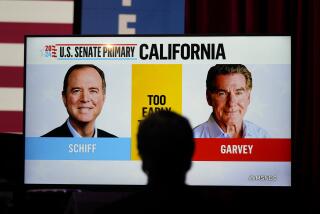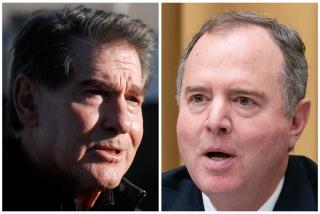Rival’s Criticism May Benefit Senator
- Share via
SEATTLE — When Alaska’s senior U.S. senator, 82-year-old Ted Stevens, came here on a speaking swing last month, the seven-term Republican issued what sounded like an extraordinary jeremiad against his Washington state colleague Maria Cantwell, a first-term Democrat who was all of 10 years old when Stevens started serving in the Senate.
“I can’t remember until these past few years any senator from your state who wasn’t a close friend of mine,” Stevens told chamber of commerce members in Tacoma. “That is a problem.”
Nobody had any doubt that the nonfriend Stevens was referring to was Cantwell, a former Seattle software executive who has raised Stevens’ hackles by vigorously opposing drilling in Alaska’s Arctic National Wildlife Refuge and taking other “extremist” environmental positions, as Stevens calls them.
Nor does anyone doubt that the conservative Stevens feels some genuine rage against her stances, or that he sees her as the archetype of an out-of-touch liberal Seattle elitist. Indeed, Stevens doesn’t share much of anything with Cantwell, other than the fact that both were born in Indiana.
But in the looking-glass world of politics, Cantwell, who is up for reelection this year, might just conclude that Ted Stevens is one of the best friends she has ever had.
Polls here suggest that far from hurting Cantwell, Stevens’ highlighting of her environmental platform could raise her visibility on issues that play well for her in an environmentalistleaning “blue” state that voted comfortably for Democrats in the last four presidential elections.
Cantwell drew wide favorable coverage earlier this year when she took on Stevens over a bill he sponsored that would have allowed more oil tankers into Puget Sound.
While people in the Seattle region drive just as much as anyone else, they hate the idea of tankers befouling their iconic estuary, and Stevens’ bill was so unpopular here that even Cantwell’s Republican opponent pleaded with him to withdraw it.
Stevens did so, saying he had been persuaded by the GOP candidate, Mike McGavick, a former chief of staff to Slade Gorton -- the Republican incumbent whom Cantwell ousted six years ago in a bruisingly close race.
But even though McGavick sought the credit for Stevens’ change of heart -- he called himself a “voice of Northwest common sense, Northwest civility” -- it was Cantwell who was widely cast in news articles as the one who had taken on Stevens, and won.
“Cantwell nemesis yields on tankers,” ran a typical headline in the Tacoma News Tribune.
In overwhelmingly Republican Alaska, Stevens’ public disdain for his Democratic anti-drilling colleague plays well, although just about nobody there seems to think he needs any help should he decide to run for an eighth term when he’s up for reelection in 2008.
So adept is Stevens at directing federal largesse to his home state that many Alaskans archly refer to federal dollars that come their way as “Ted Stevens money,” and the international airport in Anchorage is already named after him.
For now, Cantwell has tried to play down Stevens’ tirade against her, treating him more like a respected uncle who had an unfortunate outburst of temper than an archvillain.
“We have a history of cooperating on a lot of issues,” she told reporters, somewhat brightly, when asked about his comments.
In what seems to be a Democratic year in a Democratic-leaning state, Cantwell hasn’t showed up at the top of national lists of Congress’ most vulnerable incumbents, and McGavick, a former insurance company executive, has struggled a bit to raise both his profile and campaign money.
But as the campaign swings into high gear, many experts here say Cantwell could find herself in trouble: She won by fewer than 2,500 votes out of 2.4 million cast in 2000, and the Republican base may be unusually motivated to work for McGavick because of continuing ire over the 2004 election for governor -- one of the closest statewide races in U.S. history.
After two machine-read counts of the ballots put Republican Dino Rossi ahead, the Democratic gubernatorial candidate, Chris Gregoire, won an extraordinary hand recount of all the ballots, a result certified by the courts but decried by many Republicans as old-fashioned election stealing.
Perhaps more important for Cantwell, she also is facing unusual dissension from voters to her left: Many liberal Seattleites criticize her for supporting President Bush on the Iraq war. These voters could sit on their hands come election day or cast ballots for the Green or Libertarian party candidates, both of whom are antiwar.
The state’s Democratic Party chairman, Dwight Pelz, caused a stir earlier this month when he said of the antiwar camp in his party: “Definitely right now there are a lot of activists who are not signing up to work on her campaign, and that’s very clear.”
Pelz quickly apologized and reminded voters of all the reasons they should support Cantwell -- her fight against Stevens on environmental issues chief among them. (Pelz said of Stevens’ visit: “Ted Stevens is a very small man from a very big state and he’s come here to make good on his threat to Maria Cantwell, and the voters of Washington state won’t stand for it.”)
Cantwell has yet to put up television ads for her campaign, but pollsters say that Stevens could prove to be a tailor-made foil for her: a big, bad wolf from Alaska whom Cantwell “stopped from sending supertankers into the Sound,” as one of her spokeswomen put it.
“Whatever Stevens’ intentions were, I think he basically helped her” with his visit, said Stuart Elway, an independent pollster here who puts Cantwell comfortably ahead but emphasizes that most voters haven’t really tuned in to campaign specifics. “She can use this guy to remind people of where she stands on environmental issues.”
Another potential line of attack for her is the fundraising help that McGavick has gotten from Stevens and from unpopular Republicans such as Vice President Dick Cheney.
McGavick traveled to Alaska for a fundraiser last month and took in $80,000, but it could cost him: Several political consultants said they could envision Cantwell doing a campaign spot asking why her opponent was raising money in such a pro-oil-industry, pro-drilling-in-the-Arctic state.
And at Potlatch, an annual Washington, D.C., dinner last weekend for those in the nation’s capital with ties to Washington state, Democratic U.S. Rep. Rick Larsen joked that Republican McGavick was doing a great job of running for U.S. senator -- from Alaska.
Meanwhile, in Alaska, the Cantwell-Stevens rift has been portrayed in a very different light than it was in Seattle.
“Bashing Alaska goes way back,” ran the headline over an editorial last month by the Anchorage Times, once a daily paper in that city that now survives as a page of editorials and commentary published in its old rival, the Anchorage Daily News.
“There’s nothing new about Seattle interests beating up on Alaska,” according to the editorial, which described them as “jealous of the influence” of powerful senior Alaskan figures such as Stevens.
More to Read
Sign up for Essential California
The most important California stories and recommendations in your inbox every morning.
You may occasionally receive promotional content from the Los Angeles Times.










